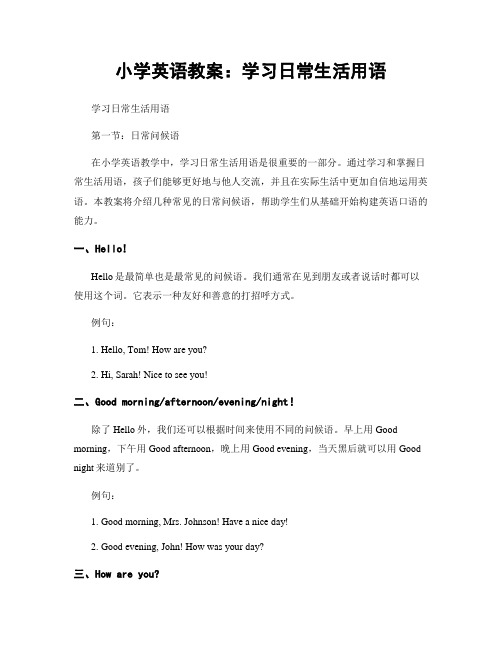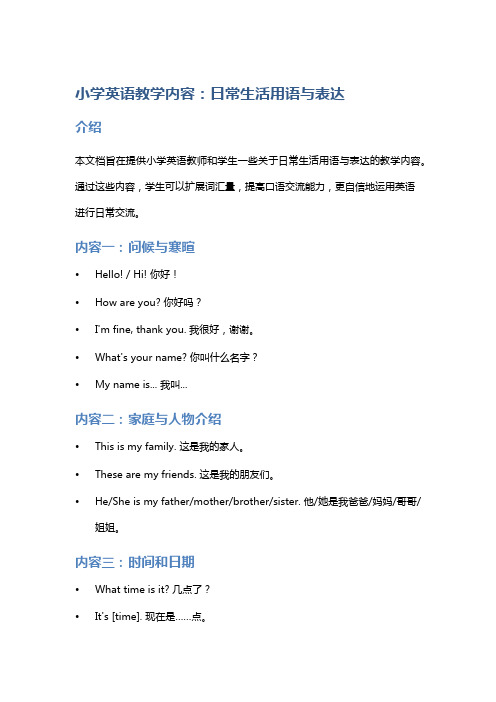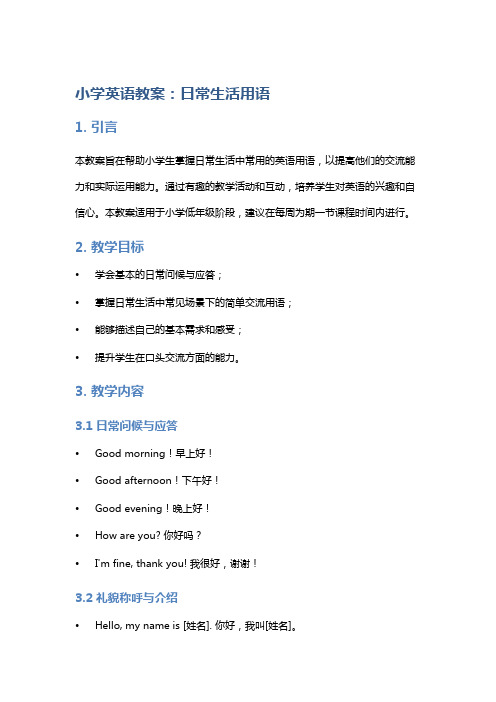英语——日常生活中使用的短句讲课稿
大学日常生活英文演讲稿

Ladies and gentlemen,Good morning/afternoon/evening. It is my great pleasure to stand before you today and share with you a glimpse into the daily life of a university student. University life is a unique and vibrant experience that shapes us into the individuals we are today. In this speech, I will take you through a typical day in the life of a university student, highlighting the challenges, opportunities, and the essence of student life.I. Morning RoutineA. Waking up at dawnUniversity students often have early classes, so waking up at dawn is a common occurrence. The alarm clock rings, and we drag ourselves out of bed, preparing for the day ahead.B. Breakfast and morning preparationsA healthy breakfast is essential to kickstart our day. We grab a quick bite, freshen up, and get ready for class, ensuring we have everything we need.C. Heading to classWe leave our dormitory, dressed in our university attire, and head to class. The journey to class may involve walking, cycling, or usingpublic transportation, depending on the distance.II. ClassesA. Attending lecturesUniversity classes are diverse, covering a wide range of subjects. We attend lectures, participate in discussions, and take notes, striving to grasp the essence of the course material.B. Group work and assignmentsUniversity life is not just about lectures. We often engage in group work and individual assignments, which require collaboration and critical thinking skills.C. Studying and self-improvementAfter classes, we spend time studying and self-improving. This may involve revising notes, reading textbooks, or attending study groups.III. Lunch BreakA. Socializing with friendsDuring lunch break, we catch up with friends, sharing our experiences and forming lasting friendships. This time is essential for building a support system.B. Exploring the campusWe explore the university campus, visiting libraries, cafes, and recreational areas. This break allows us to relax and recharge our energy.IV. Afternoon ActivitiesA. Extracurricular activitiesUniversity life is not limited to academics. We participate in extracurricular activities, such as sports, clubs, and volunteer work, which help us develop new skills and interests.B. Personal timeWe also spend time on personal interests, such as reading, watching movies, or practicing a hobby. This time is crucial for maintaining a balanced lifestyle.V. Evening RoutineA. Dinner and relaxationWe have dinner with friends or family, followed by some relaxation time. This may involve watching TV, playing video games, or simply enjoying a cup of tea.B. Preparing for the next dayBefore bedtime, we prepare for the next day. This includes packing our bags, setting alarms, and ensuring we have everything ready for the upcoming challenges.VI. Challenges and OpportunitiesA. Balancing academics and personal lifeUniversity life can be challenging, as we have to balance our academic responsibilities with personal life. Time management and prioritization skills are crucial for success.B. Networking and personal growthUniversity provides us with numerous opportunities to network and grow personally. We meet people from diverse backgrounds, learn new skills, and discover our passions.VII. ConclusionIn conclusion, a day in the life of a university student is a blend of academic rigor, social interactions, and personal growth. We face challenges and embrace opportunities, all while creating unforgettable memories. University life is a journey that shapes us into well-rounded individuals, equipping us with the knowledge and skills needed to succeed in the future.Thank you for listening to my speech. I hope you have gained a better understanding of the vibrant and dynamic world of university life. If you have any questions or comments, please feel free to share them with me.。
小学英语教案:学习日常生活用语

小学英语教案:学习日常生活用语学习日常生活用语第一节:日常问候语在小学英语教学中,学习日常生活用语是很重要的一部分。
通过学习和掌握日常生活用语,孩子们能够更好地与他人交流,并且在实际生活中更加自信地运用英语。
本教案将介绍几种常见的日常问候语,帮助学生们从基础开始构建英语口语的能力。
一、Hello!Hello是最简单也是最常见的问候语。
我们通常在见到朋友或者说话时都可以使用这个词。
它表示一种友好和善意的打招呼方式。
例句:1. Hello, Tom! How are you?2. Hi, Sarah! Nice to see you!二、Good morning/afternoon/evening/night!除了Hello外,我们还可以根据时间来使用不同的问候语。
早上用Good morning,下午用Good afternoon,晚上用Good evening,当天黑后就可以用Good night来道别了。
例句:1. Good morning, Mrs. Johnson! Have a nice day!2. Good evening, John! How was your day?三、How are you?这是一个向对方询问“你好吗?”的方式。
通常对待亲近的朋友或者家人时会使用这个问候语。
例句:1. Hi, Lily! How are you today?2. John, how are you feeling?四、What's up?这是一个非常常见的问候语,意思是“最近怎么样?”,用于询问对方近况。
在非正式场合中,我们可以使用这个问候语来与朋友打招呼。
例句:1. What's up, guys? Any plans for the weekend?2. Hey, Jane! What's up with you?第二节:日常生活用语除了问候语外,学习和了解一些日常生活用语也是十分重要的。
日常生活的英文演讲稿简短

日常生活的英文演讲稿简短Living a daily life is a routine that we all go through. From the moment we wake up to the time we go to bed, we engage in various activities that shape our day. It is important to reflect on the significance of our daily routines and how they contribute to our overall well-being.First and foremost, our morning routine sets the tone for the rest of the day. Starting our day with a healthy breakfast, exercise, and positive affirmations can greatly impact our mood and productivity. It is essential to prioritize self-care in the morning to ensure that we are mentally and physically prepared for the day ahead.Throughout the day, we engage in various tasks such as work, school, or household responsibilities. It is important to maintain a balance between productivity and relaxation. Taking short breaks, staying hydrated, and practicing mindfulness can help us stay focused and energized throughout the day. Additionally, incorporating healthy snacks and meals into our daily routine can provide us with the necessary nutrients to sustain our energy levels.In the evening, winding down and preparing for rest is crucial for our overall well-being. Engaging in activities such as reading, meditating, or spending time with loved ones can help us relax and de-stress. Creating a calming bedtime routine, such as dimming the lights and avoiding screens, can signal to our bodies that it is time to unwind and prepare for sleep.Overall, our daily routines play a significant role in shaping our physical, mental, and emotional well-being. It is important to prioritize self-care, maintain a balance between productivity and relaxation, and create healthy habits that contribute to a fulfilling daily life. By being mindful of our daily routines and their impact on our well-being, we can cultivate a positive and healthy lifestyle. Remember, it's the little things we do every day that add up to a life well-lived.。
英语口语8000句_第一章 日常生活中使用的短句

Have you brushed your teeth?
The red one. 穿红的吧!
1 在家中 Which dress should I wear? Which one should I wear? What should I put on?
Hurry up and get dressed. 快换衣服
Hurry up or we'll be late.
Hurry or you'll be late for school.
快点,我们上学该迟到了。
What time is it? 现在几点? Did you lock the door?你锁门了吗? Have you locked the door? Aren't you forgetting something?你没...吧(你没忘什么东西吧!) I don't think so. 我想没有。
Is dinner ready? 晚饭好了吗?--Not yet.
1 在家中 Is it time for dinner yet?该吃晚饭了吧? Have you made dinner?晚饭做好了吗? Mom, what's for dinner tonight?
妈妈,今天晚饭吃什么? Mom, what did you make for dinner?
1 在家中 May I have my allowance? 能给我点零花钱吗? What do you want to buy? I‘m tired.真累呀! I'm exhausted. 我精疲力尽了
What would you like for dinner?晚饭你想吃什么?
What do you want for dinner? What do you want to eat for dinner?
小学英语教学内容:日常生活交际用语

小学英语教学内容:日常生活交际用语1. 介绍在小学英语教学中,学习日常生活交际用语是非常重要的一部分。
通过掌握这些常用的口语表达,学生可以更好地与人沟通,提升英语交流能力。
本文将介绍小学阶段适宜教授的日常生活交际用语内容及相关方法。
2. 教学内容2.1 自我介绍•表达自己的姓名、年龄、家庭成员等简单个人信息。
•提问他人的姓名、年龄等基本问题。
2.2 打招呼与寒暄•常见的问候语如"Hello!"、"Good morning/afternoon/evening!"等。
•回应他人问候时应掌握相应的回答如"Hi!"、"Goodmorning/afternoon/evening!"等。
•向他人询问对方近况如"How are you?",并进行简单回答。
•平时寻找机会让学生模拟真实场景进行对话练习。
2.3 提出请求与表示意愿•学会礼貌地提出请求:"Can I have...?"、"Could you please...?"等。
•学会礼貌地表示意愿:"I want..."、"I would like..."等。
2.4 表达喜好与不喜欢•学会用简单的形容词表达自己对事物的喜好与不喜欢,例如:"I like/love/enjoy..."、"I don't like/hate/dislike..."等。
2.5 邀请与应答•学会用英语邀请他人参加活动如生日聚会、学校活动等。
•掌握礼貌地回答邀请的方式,包括接受与谢绝。
2.6 感谢与道歉•学会用英语表达感谢之情,例如:"Thank you!"。
•理解道歉的重要性,并学会用合适的语言表达歉意如"I'm sorry"。
小学英语教学内容:日常生活用语与表达

小学英语教学内容:日常生活用语与表达介绍本文档旨在提供小学英语教师和学生一些关于日常生活用语与表达的教学内容。
通过这些内容,学生可以扩展词汇量,提高口语交流能力,更自信地运用英语进行日常交流。
内容一:问候与寒暄•Hello! / Hi! 你好!•How are you? 你好吗?•I'm fine, thank you. 我很好,谢谢。
•What's your name? 你叫什么名字?•My name is... 我叫...内容二:家庭与人物介绍•This is my family. 这是我的家人。
•These are my friends. 这是我的朋友们。
•He/She is my father/mother/brother/sister. 他/她是我爸爸/妈妈/哥哥/姐姐。
内容三:时间和日期•What time is it? 几点了?•It's [time]. 现在是……点。
•Today is [date]. 今天是……。
内容四:身体部位和感觉•Head 头部•Eyes 眼睛•Nose 鼻子•Mouth 嘴巴•I'm hungry/tired/sick/happy/sad. 我饿了/累了/病了/开心/难过。
内容五:购物与饮食•How much is it? 多少钱?•Can I have...? 我可以要……吗?•Do you like [food]? 你喜欢[食物]吗?•I want to buy... 我想买……内容六:日常活动和爱好•What do you like to do in your free time? 你有空时喜欢做什么?•I like [activity/hobby]. 我喜欢[活动/爱好]。
•I enjoy playing soccer/reading books/drawing/listening to music. 我喜欢踢足球/读书/画画/听音乐。
小学英语教案:日常生活用语

小学英语教案:日常生活用语1. 引言本教案旨在帮助小学生掌握日常生活中常用的英语用语,以提高他们的交流能力和实际运用能力。
通过有趣的教学活动和互动,培养学生对英语的兴趣和自信心。
本教案适用于小学低年级阶段,建议在每周为期一节课程时间内进行。
2. 教学目标•学会基本的日常问候与应答;•掌握日常生活中常见场景下的简单交流用语;•能够描述自己的基本需求和感受;•提升学生在口头交流方面的能力。
3. 教学内容3.1 日常问候与应答•Good morning!早上好!•Good afternoon!下午好!•Good evening!晚上好!•How are you? 你好吗?•I'm fine, thank you! 我很好,谢谢!3.2 礼貌称呼与介绍•Hello, my name is [姓名]. 你好,我叫[姓名]。
•Nice to meet you! 很高兴认识你!3.3 常见场景下的交流用语3.3.1 在学校•May I go to the bathroom, please? 我可以去洗手间吗?•Can I borrow a pencil, please? 我可以借一支铅笔吗?•Thank you! 谢谢!3.3.2 在家里•What's for dinner today? 今天的晚餐是什么?•I like this book! 我喜欢这本书!•Can I have some water? 我可以喝点水吗?3.3.3 外出活动•Excuse me, where is the restroom? 对不起,请问洗手间在哪里?•How much is this toy? 这个玩具多少钱?•Have a nice day! 祝你有个美好的一天!4. 教学活动4.1 角色扮演游戏让学生分组,每组选择一个场景进行角色扮演,例如在学校、在家里或者外出活动,在规定时间内用所学的英语用语进行对话。
日常交际用语说课(课件)通用版英语

汇报人:xxx
目
教学背景
录
教学重难点
教学准备
教学过程
课堂延伸
教学反思
01
教学背景
适用对象
教学目标
• 知识目标 • 学生能够了解和掌握以下日常交际用语 • 问候与打招呼(如:Hello, Good morning等)。 • 介绍(如:This is, My name is等)。 • 道歉与感谢(如 • Sorry, Thank you等) • 能力目标:学生能够运用所学的日常交际用语进行真实的对话。具体包括
03
以给予掌声鼓励。
教师点评与总结
结合学生的小组表演,教师对学生的表现进行 点评和总结。
针对学生在表演中出现的不足之处进行指导和 辅导,并请其他小组的学生进行优秀表演展示 。
强调在日常交际中正确使用英语的重要性,以 及通过本节课的学习学生们能够学到什么。
05
课堂延伸
学生练习安排
可以通过组织学生进行情景剧的排练及表演,来 进一步加深学生对日常交际用语的理解和应用。 学生们可以自由组队,选择自己喜欢的场景进行 排练,并在课堂上进行展示
如何通过教学环节的设计,使学生能够自主运 用学到的交际用语进行真实的对话,提高口语 表达能力。
如何通过小组活动等方式,培养学生的合作精
3
神和口语表达能力,并鼓励他们积极参与到课
堂活动中来。
03
教学准备
教学资源
制作有关日常交际用语的PPT,包括问候、介绍 、道歉、感谢等场景及其用法。
视频/录音素材
小组活动和个人表达环节中,学生都能对其他同 学的表现进行评价,能发现其他同学的优点和不 足,并在之后的个人发言中得以改正和提高。
对于日常交际用语的掌握情况比较理想,大部分 学生都能在相应的场景下正确使用这些用语。
- 1、下载文档前请自行甄别文档内容的完整性,平台不提供额外的编辑、内容补充、找答案等附加服务。
- 2、"仅部分预览"的文档,不可在线预览部分如存在完整性等问题,可反馈申请退款(可完整预览的文档不适用该条件!)。
- 3、如文档侵犯您的权益,请联系客服反馈,我们会尽快为您处理(人工客服工作时间:9:00-18:30)。
第一章日常生活中使用的短句一.在家中从起床到出门早晨好Good morning.闹钟响了吗?Did the alarm clock go off?该起床了It’s time to get up.快点起床Get up soon.你醒了吗Are you awake?你不舒服吗?Are you feeling sick?睡得好吗?Did you sleep well?能帮我关掉闹钟吗?Would you turn off the alarm clock? 你终于起来了You finally got up.今天是个好天儿It’s a nice day.昨晚你熬夜了?Did you stay up late last night?把被子叠好Let’s fold up the futon.昨天晚上你打呼噜了You were snoring last night.我做了个可怕的梦I had a nightmare.你一直没关灯啊You left the light on.我得洗脸了I have to go wash my face.该吃早饭了It’s time to eat breakfast.我还困着呢I’m still sleepy.我还打哈欠呢I’m still yawning.昨天的酒还没醒呢I have a hangover.我是个夜猫子I’m a night person.我是用咖啡来提神的Coffee wakes me up.刷牙了吗?Did you brush your teeth?我得梳梳头了I have to comb my hair.穿什么好呢What should I wear?快换衣服Hurry up and get dressed.把睡衣收好Put those pajamas away.我走了,妈妈I’m leaving. Bye, mom.今天我们逃学吧Let’s play hooky today.你毛衣穿反了You’re wearing your sweater inside out. 上下颠倒了It’s upside down.别忘了扔垃圾啊Don’t forget to take out the garbage.今天该你扔垃圾了It’s your turn to take out the garbage. 今天你干什么What are you doing today?你快点,我们该迟到了If you don’t hurry, we’ll be late.快点,上学该迟到了Hurry, or you’ll be late for school. 你锁门了吗?Did you lock the door?没忘了什么东西吧?Aren’t you forgetting something? 都已经八点了It’s already 8 o’clock.我晚了I’m late.我得赶紧走I have to rush.你今天会回来的晚吗?Are you gonna be late today?几点回来?What time are you coming home?饭盒带了吗?Have you got your lunch box?今天好像要下雨It might rain today.出门的时候可别忘了锁门Don’t forget to lock the door when you leave.从回家到就寝我回来了I’m home.你回来了Welcome home.今天过得愉快吗Did you have a good time?今天怎么样?How did you go today?我可以出去玩会吗?Can I go out to play?我饿了I’m hungry.点心在哪?Where are the snacks?我去补习学校了I’m going to cram school now.能给我点零花钱吗?May I have my allowance?真累啊I’m tired.晚饭你想吃什么?What would you like for dinner?你能帮我准备餐具吗?Would you help me set the table?晚饭做什么好呢?What should I make for dinner?还是家好啊It’s good to be home.你能不能赶紧去趟商店?Would you run to the store?洗澡水烧好了The bath is ready.我要冲个澡I’m taking a shower.晚饭做好了吗?Is dinner ready?妈妈,今天晚饭吃什么?Mom, what’s for dinner tonight? 晚饭吃什么?What’s for dinner?今天吃咖喱饭Today we’re having curry.还要多久才能做好呀? How soon can you get it ready?我吃了啊Let’s eat.请先吃吧Please go ahead.这把刀真快呀This knife cuts well, doesn’t it?水开了The water is boiling.开饭了Come and get it.该吃饭了It’s time to eat.这就来I’m coming.手洗干净了吗?Did you wash your hands well?别弄洒了Don’t spill it.把碗里的菜吃光Eat all of your vegetables.把饭吃光Finish up your plate.我不喜欢吃芦笋I don’t like asparagus.谢谢您的款待It was very delicious. Thank you.能帮我收拾盘子吗?Would you clear the table?把盘子洗了Do the dishes.我擦盘子I’ll dry the dishes.你干什么呢?What are you doing?我看电视呢I’m watching TV.有什么好看的节目吗?Are there any good programs on TV?以茂上电视了Nomoo is on TV.八频道演什么呢?What’s on Channel 8?能不能帮我换个台?Would you change the channel?我还想看电视I want to watch more TV.铺床吧Let’s bred up the futon.我困了I’m sleepy.作业做了吗?Did you do your homework?好好学习Study hard.快点睡觉Hurry up and go to sleep.游戏玩够了吧?Enough with your video games.一定要刷牙啊Make sure you brush your teeth.明天的东西都准备好了吗?Are you ready for tomorrow? 我去洗个澡I’m going to take a bath.该睡觉了Time to go to sleep.电视还开着呢You left the TV on.别把你的东西都摊在这Don’t leave your stuff here.把闹钟定在八点了I set the alarm clock for eight.明天七点叫醒我Wake me up at seven tomorrow.晚安Good night.做个好梦Sweet dreams.休息日,我真想睡个午觉I want to take a nap.我去躺一会I’m going to lie down.你在装睡啊You are pretending to be asleep.你睡着了吗?Were you sleeping?没有,还没睡呢。
No, I was awake.你能给孩子换块尿布吗?Would you change the baby’s diaper. 想尿尿吗?Do you need to pee.该尿尿了It’s time to go wee-wee.我们来投球吧Let’s play catch.漏水了The water is leaking.全是灰啊It’s so dusty.这间屋子通风真差It’s stuffy in this room.这个房间很通风It’s drafty in this room.你能去喂喂狗吗Will you feed the dog?你去遛遛狗吧Would you take the dog for a walk?帮我照看一下弟弟和妹妹啊Take care of my brother and sister 请给植物浇点水Please water the plants.啊,怎么这么乱呀What a mess!帮帮我吧Help me.把你的屋子收拾收拾Clean up your room.帮我打扫打扫卫生Help me clean up the house.洗涤灵用完了We are out off dish detergent.你能把衣服晾上吗Would you put up the clothes to dry?你能帮我把衣服叠起来吗?Will you help me fold up the clothes?把地扫扫Please sweep the floor.把厨房的池子洗干净Please scrub the sink.我得用吸尘器吸吸我房间了I have to vacuum my room. 掸掸柜子上的土Please dust the shelves.请拖拖地Please mop the floor.你能把那件衬衫熨熨吗Will you iron the shirt?我的裙子得熨了I have to iron my skirt.我们去超市买东西吧Let’s go grocery shopping.公园里人挤人The park was crowded.今晚能帮我照看一下孩子吗Can you babysit tonight?送礼物这是送给你的This is for you.这是你的那份This is your share.过生日想要什么礼物What do you want for your birthday? 喔,来咯Tadaaaah生活习惯我经常下班以后运动I usually walk out after work.我开始慢跑锻炼I’ve started jogging.我戒烟了I quit smoking.你常做梦吗Do you dream often?最近,我总是丢三落四的I’ve been forgetful lately.理财什么时候到期When is this due?缴费日期截止到30号It’s due on the 30th.能帮我换一下零钱吗Could you give me change?能帮我换开一百日元吗Do you have change for 100 yen?我要存5000日元I need to deposit 5000 yen in my savings account.我要取5000日元I need to withdraw 5000 yen from my savings account.我是自己掏的腰包I paid out of my own pocket.我没带现金I’m out of cash.我现在没有多少现金I don’t have much money on me now.身无分文I’m broke.现在我有很多现金I have a lot of money on me now.我可没有时间闲呆着I can’t afford to be lazy.多浪费啊What a waste!他因为还不上债而躲了起来He didn’t paid the debt and disappeared.。
